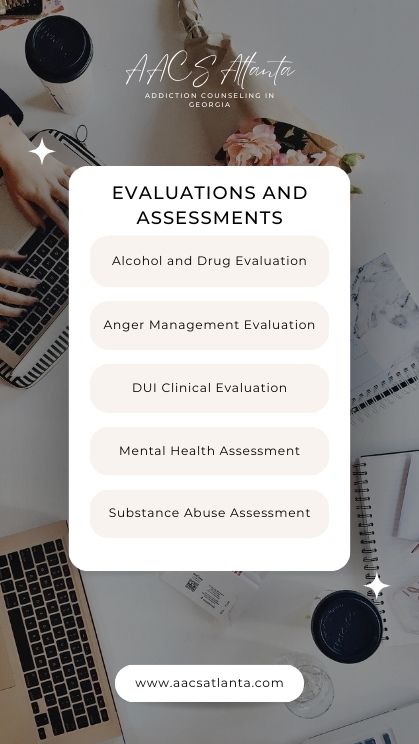Introduction: The Significance of Alcohol and Drug Evaluation in Georgia
Alcohol and drug evaluation plays a crucial role in addressing substance abuse issues and guiding individuals towards recovery. In the state of Georgia, where substance abuse is a prevalent concern, undergoing an evaluation is a vital step towards understanding the severity of addiction and determining appropriate treatment options. This comprehensive guide aims to provide an in-depth understanding of alcohol and drug evaluation in Georgia, including the evaluation process, the role of licensed professionals, different types of evaluations available, the implications of evaluation results, and available resources for seeking help and support.
The Process of Alcohol and Drug Evaluation in Georgia
The alcohol and drug evaluation process in Georgia involves several key steps that help assess an individual’s substance abuse issues accurately. These steps typically include:
- Initial Assessment: During the initial assessment, individuals meet with a licensed evaluator who gathers relevant information about their substance abuse history, medical background, and personal circumstances. This information serves as a foundation for further evaluation.
- Assessment Criteria: Licensed professionals use standardized assessment criteria to evaluate the severity of an individual’s substance abuse. These criteria may include factors such as the frequency and quantity of substance use, any withdrawal symptoms experienced, and the impact of substance use on the individual’s daily life.
- Screening Tools: Evaluators often employ screening tools such as questionnaires and interviews to gather additional information about an individual’s substance use patterns, behaviors, and any co-occurring mental health disorders. These tools aid in developing a comprehensive understanding of the individual’s situation.
- Interview Process: The evaluation process involves detailed interviews with the individual, allowing the licensed professional to delve deeper into their substance abuse history, potential triggers, and the impact of substance use on various aspects of their life.
- Documentation Required: Individuals may be required to provide relevant documentation, such as medical records, prior treatment history, or legal documents if the evaluation is court-ordered. This documentation aids in obtaining a comprehensive understanding of the individual’s situation.
The Role of Licensed Professionals in Conducting Evaluations
Licensed professionals, such as qualified assessors and certified addiction counselors, play a critical role in conducting alcohol and drug evaluations in Georgia. Their expertise enables them to gather accurate information, make informed assessments, and provide appropriate treatment recommendations. The role of licensed professionals in conducting evaluations includes:
- Expertise in Substance Abuse Assessment: Licensed professionals possess specialized knowledge and training in substance abuse assessment. They are equipped with the necessary skills to evaluate an individual’s substance abuse patterns, severity, and potential underlying issues.
- Comprehensive Understanding of Evaluation Methods: Licensed professionals are well-versed in using various evaluation methods and tools to gather relevant information. They know how to interpret the results of these evaluations accurately to guide treatment planning effectively.
- Objective and Non-Judgmental Approach: Licensed professionals approach evaluations without judgment, creating a safe and supportive environment for individuals seeking help. They ensure confidentiality and adhere to professional codes of conduct throughout the evaluation process.
- Developing Treatment Recommendations: Based on the evaluation results, licensed professionals can develop personalized treatment recommendations tailored to the unique needs of each individual. These recommendations may include therapy, counseling, support groups, or referral to specialized treatment centers.
Understanding the Different Types of Evaluations Available in Georgia
In Georgia, several types of evaluations are conducted to address specific needs and situations related to substance abuse. These evaluations include:
- DUI Evaluations: DUI (Driving Under the Influence) evaluations are often required for individuals charged with driving while under the influence of alcohol or drugs. These evaluations assess the individual’s level of substance abuse and determine the appropriate course of action.
- Court-Ordered Evaluations: Court-ordered alcohol and drug evaluations may be mandated as a part of legal proceedings related to substance abuse, such as probation or custody cases. These evaluations help inform court decisions and guide appropriate treatment recommendations.
- Probation Evaluations: Individuals on probation may be required to undergo evaluations to assess their progress in substance abuse treatment and compliance with court-ordered requirements. These evaluations help determine if individuals are adhering to treatment plans and making positive changes.
- Workplace Evaluations: Some workplaces require substance abuse evaluations as part of their policies or after an incident related to substance abuse. These evaluations help assess the impact of substance abuse on an individual’s job performance and safety.
The Implications and Consequences of Evaluation Results
The evaluation results can have various implications and consequences for individuals undergoing assessment. These may include:
- Treatment Recommendations: Evaluation results guide the development of personalized treatment recommendations. These recommendations may include outpatient or inpatient treatment programs, counseling, therapy, or other support services based on the severity of the substance abuse issue.
- Legal Consequences: In legal contexts, evaluation results can influence court decisions and legal







